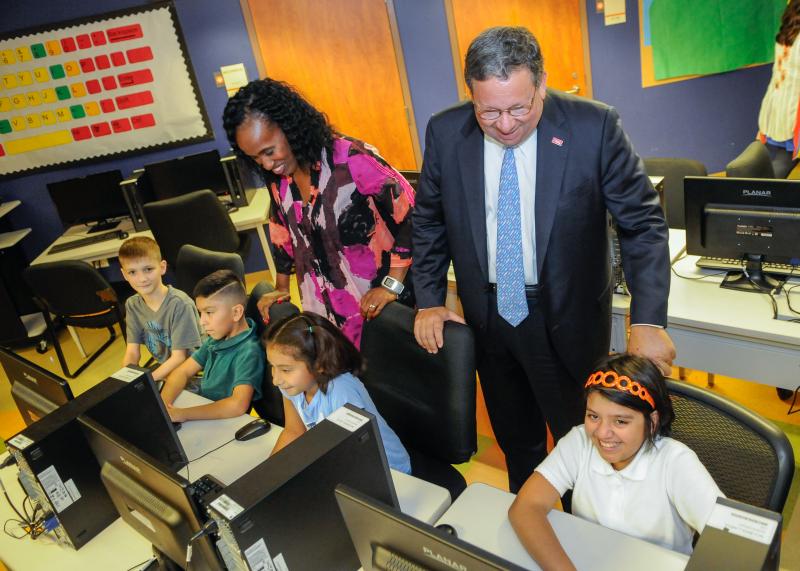High-speed Internet... social media... broadband... mobile apps... online...e-commerce... smartphones... digital streaming... selfies... GPS systems.
These words were not part of the national vocabulary 50 years ago.
Back in 1968, the digital revolution that now permeates the lives of most Americans was unimaginable. Today, giving all Americans full access to the benefits of the Internet is an essential part of delivering on Dr. Martin Luther King's still unrealized vision of a "beloved community" founded on economic and social justice.
To realize Dr. King's vision in modern America, we need to pursue the kind of digital inclusion that will allow Black Americans, and all U.S. citizens, to be equal players in the digital economy. One obvious priority is to close the much-discussed "digital divide" that separates families who enjoy high-speed Internet connections at home from those who don't.

David L. Cohen visiting with students
In 21st Century America, homes without Internet connections are the digital equivalent of homes without electricity or running water. According to the most recent research, more than 25 percent of American households are living without this opportunity despite three quarters of these families living in homes where the broadband plant has been built out to their neighborhoods. Those households are overwhelmingly low-income and disproportionately include people of color. In fact, in households making less than $30,000 a year nearly 50 percent (47%) nationwide do not have an Internet connection.
In a cruel irony of the digital divide, Internet technology that could help low-income families move ahead is actually pushing them further behind due to non-adoption. As a leader in the media and technology industry, this situation is intolerable to Comcast NBCUniversal.
In 2011, we created Internet Essentials, which is now the nation's most comprehensive and successful low-income broadband adaption program. Through June 2017, Internet Essentials has connected more than four million people in one million households across the country, and more than 80 percent of our Internet Essentials customers are people of color.
Through the program, low-income households are eligible to receive a high-speed Internet connection for $9.95 a month along with in-home WiFi and access to more than 19 million Xfinity WiFi hotspots out of the home for 40 hours per month at no extra cost. Internet Essentials customers also have the option of purchasing an Internet-ready computer for $150. As all the research demonstrates that it is the bucket of digital literacy and digital relevance issues that is the most substantial barrier to broadband adoption; we support free digital literacy training in print, in person, and online, in English or Spanish, so people can make full use of the Internet through a network of more than 9,000 partners, like the National Urban League.
By way of example, through support from the Comcast Foundation, Urban League Affiliates in Atlanta, Chicago, Detroit, Philadelphia, Sacramento, Seattle, Springfield, and West Palm Beach are providing digital literacy training for families in cities across the country.
We are also proud to partner with nonprofits encouraging young African Americans with an interest in technology to take part in the fast-expanding digital economy. For example, In Chicago, we have partnered with Black Tech Mecca (BTM) to ensure African Americans are full participants in the city's technology sector. We are currently working with BTM to apply the lessons learned in Chicago in our hometown of Philadelphia.
In Miami, we admire and support the work of Code Fever, which trains students 13 to 21 years old to code and eventually launch their own tech startups. These kids will enter a tech arena already strengthened by promising black-owned startups. To encourage these entrepreneurs, Comcast Ventures also launched a $20 million venture capital fund that has partnered with 80 minority-owned startups.
I offer these examples by way of expressing my confidence that the state of Black America and the state of the digital revolution share an intertwined and promising future. That future, of course, depends on continued support to improve digital inclusion in a way that is equitable. This type of inclusion must be supported by the diversity and inclusion practices of tech companies. Diversity and inclusion are long-standing priorities at Comcast NBCUniversal—deeply rooted in our desire to do the right thing from a moral perspective and the right thing for the future growth of our company.
Comcast NBCUniversal is now regarded as a national leader in diversity and inclusion, and was ranked #1 by Fortune Magazine in its annual 100 Best Workplaces for Diversity list. This makes us proud—but not complacent. Our diversity and inclusion goals for the future are set ambitiously high. They will not be easy to reach, but we are confident that every step ahead will make us a stronger company and help bring us all closer to a world where we can live together in Dr. King's "beloved community."



